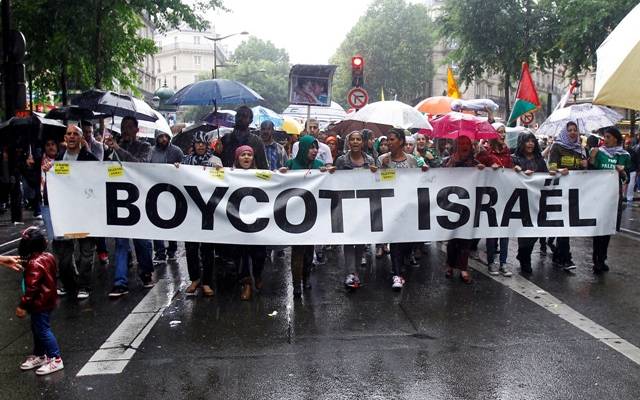The United Church of Christ joined other American churches in boycotting Israeli businesses in Judea and Samaria. Israel’s foreign ministry slammed the move, saying their position is not based on reality.
The top legislative body of the United Church of Christ (UCC) voted Tuesday to divest from companies with businesses in Judea and Samaria.
The denomination’s General Synod endorsed the action on a vote of 508-124 with 38 abstentions during its meeting in Cleveland.
The 1.1-million-member Christian organization is not the first to do so. Last year, the Presbyterian Church (USA) voted to sell stock in a few companies whose products were used in Judea and Samaria.
The UCC’s resolution was broader. Delegates called on the denomination’s financial arms to sell off stock in any company profiting from what the church called “human rights violations arising from the occupation.” The church also voted to boycott Israeli products made in Judea and Samaria, although such action harms first and foremost the Palestinian employees at these Israeli factories.
In 2005, the UCC passed a resolution calling for “economic leverage” to resolve the Israeli-Palestinian conflict and accused Israel of widespread human rights abuses against the Palestinians.
Peter Makari of Global Ministries, an agency that is part of the UCC, said the resolutions “reflect our urgent concern for the worsening effects of the Israeli occupation on Palestinian people and lives, including the disparity in rights and power.” The church affirmed Israel’s right to exist along with a “sovereign, independent” Palestinian state.
‘Radical’ and ‘Immoral’ Policies
Israel’s foreign ministry slammed the church’s call for a boycott as “immoral.”
Foreign Ministry spokesman Emmanuel Nahshon said the denomination’s policies have “reflected the most radical politics for more than a decade and in no way reflect a moral stance or reality-based position.”
“People of faith ought to be acting to help Israel and the Palestinians to renew efforts to achieve peace rather than endlessly demonizing one party in the conflict — in our view, the aggrieved party,” Nahshon said.
Also on Tuesday, a UCC resolution that would have labeled the “Israeli occupation” as a “South African-style apartheid” failed. The measure required a two-thirds majority to pass, but delegates were nearly split, with 312 in favor and 295 opposed, along with 31 abstentions.
Separately, the Episcopal Church, meeting in Salt Lake City, was scheduled to consider a divestment resolution this week. At yet another meeting, the Mennonite Church USA will also take up a divestment proposal Wednesday.
The votes are occurring as the anti-Israel boycott, divestment and sanctions movement, known as BDS, is gaining strength on US college campuses and in many universities in Europe. The Israeli government and many Jewish leaders have condemned the movement as anti-Semitic and an attempt to delegitimize Israel.
The American Jewish Committee (AJC), an advocacy group based in New York, slammed the UCC resolutions and said the action would “bolster those who oppose peace.”
Empty Rhetoric with Negligible Effect
The two major financial arms of the United Church of Christ — a pension board and an investment fund — together control nearly $4 billion dollars. However, each is guided by directors who could decide whether to follow the call for divestment. If the financial agencies do sell off stock, the economic impact on Israel is expected to be negligible.
Last year, the 12.8-million-member United Methodist Church revealed plans to sell holdings in G4S, which provides security equipment and has contracts with Israel’s prison system. Then in January, the Methodist pension board issued new investment guidelines meant to prioritize human rights. Methodists advocating divestment to pressure Israel say the guidelines have led to no concrete action.
By: AP and United with Israel Staff
